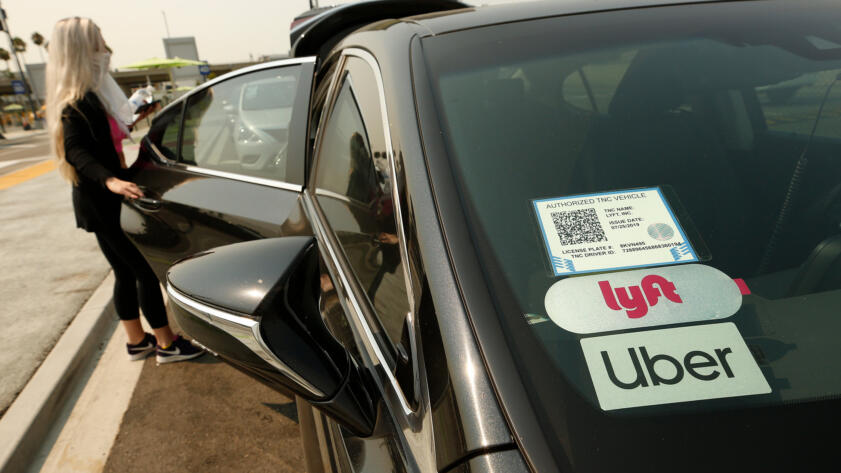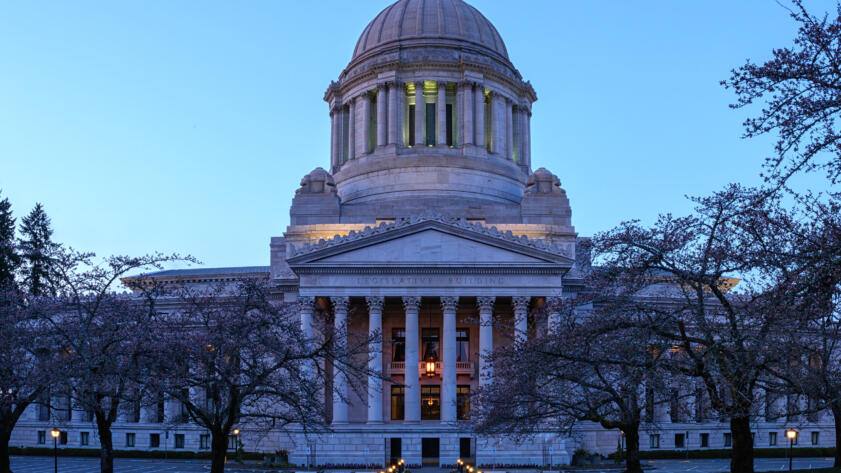This week, the Washington State legislature became the first in the nation to pass legislation that ensures Uber and Lyft drivers are not considered employees. The bill, HB2076, is part of a nationwide struggle between the gig companies and labor advocates over drivers’ status and rights and could pave the way for other states to pass similar legislation.
HB2076 offers drivers some benefits that most don’t currently have—including sick leave and minimum wage standards when they have a passenger in the car. It doesn’t require the companies to provide health insurance.

News
Bill in Washington State Would Be First to Bar Uber and Lyft Drivers from Being Classified As Employees
The gig companies and a local Teamsters union helped shape the measure’s language
The bill passed its final round of House votes on Monday 56 to 42. The state Senate passed it last Friday. Barring a veto by Gov. Jay Inslee, the legislation will automatically become law in a few weeks, and the minimum wage and sick leave provisions for drivers will go into effect at the start of 2023. Mike Faulk, a spokesperson for Inslee, said the governor has yet to take a position on the legislation.
Uber and Lyft have long argued that classifying drivers as contractors, rather than employees, is necessary for their apps to work efficiently. And Teamsters Local 117, which also helped craft the bill, heralded HB2076 as providing ride-hail drivers with “historic benefits statewide.”
Worker advocates, however, said they’re concerned that the bill doesn’t provide sufficient benefits and could set a precedent in creating a second-class status for gig workers nationwide.
The legislation comes on the heels of California’s Proposition 22—a ballot measure backed by Uber, Lyft, and other gig companies that, similar to HB2076, adds some benefits for gig workers but classifies them as independent contractors, making them ineligible for employee benefits. Proposition 22 passed in California in November 2020 after the gig companies collectively poured more than $200 million into the campaign.
Since then, the companies backed a related bill in Massachusetts and have been preparing for a ballot measure campaign in that state. They’ve spent more than $1 million on television ads to fight federal legislation that would classify gig workers as employees. And they’ve partnered with local unions to work on state legislation similar to HB2076 in both Connecticut and New York.
Nicole Moore, an Uber and Lyft driver who’s also president of the driver organization Rideshare Drivers United, said it’s a fiction to label drivers as independent contractors.
“It’s not that we ‘want to become employees.’ It’s that the arrangement we currently have is one of employment,” Moore said. “The platform companies deploy complete control over our jobs: We have never set our own rates, most of the time we are not even given enough information to know if we will break even on particular rides, let alone earn a living.”
It’s not that we ‘want to become employees.’ It’s that the arrangement we currently have is one of employment.
Nicole Moore, Rideshare Drivers United
In Washington State, lobbyists for Uber and Lyft, as well as DoorDash and Instacart (which the bill doesn’t affect), have spent the past few months meeting with state representative Liz Berry, who introduced HB2076. The four companies have also formed a separate ballot-initiative committee in the state, infusing it with more than $2.6 million and having at least 35 of their employees work on the matter. DoorDash and Instacart didn’t respond to requests for comment.
Teamsters 117, which has lobbied ride-hail drivers to support HB2076, runs an affiliated collective called Drivers Union in Washington State. According to Kerry Harwin, a Drivers Union spokesperson, it has helped thousands of drivers with trainings and support.
“Drivers have long advocated for minimum wage guarantees,” he said, adding that HB2076 will give drivers a pay increase. “This bill delivers on that front.”
HB2076 also created a procedure for drivers to appeal “deactivations”—when the companies shut a driver out of the app—by Uber and Lyft. Under the bill, a nonprofit organization not affiliated with the gig companies, which is yet to be selected, would operate a “driver resource center” that would represent drivers when they appeal deactivations and provide “culturally competent driver representation services, outreach, and education.” It would be funded by a $0.15 fee for every ride.
“The drivers have been my North Star throughout this process,” Berry, the bill’s sponsor, said in a statement. “They have been asking for statewide pay raises, deactivation protections, and benefits—a better quality of life and future.”
Ramona Prieto, Uber’s head of public policy for the western U.S., said in an emailed statement, “This compromise bill gives drivers what they want.” She added, “We’re glad that the overwhelming majority of legislators put the interests of drivers first and passed legislation that will actually make a difference in the lives of workers.” Lyft didn’t respond to a request for comment.
But HB2076 specifies that drivers can only accrue time for minimum wage and benefits, like sick leave and workers’ compensation, once they’ve accepted a ride request. According to the bill, time spent waiting for passengers doesn’t count as work time. A 2019 study commissioned by Uber and Lyft found that Seattle area drivers spent nearly 40 percent of vehicle miles traveled waiting for a ride request.
“The one thing that [the companies] won’t let go of is they won’t pay people for all of the time that they work,” said Veena Dubal, an employment and labor law professor at the University of California Hastings College of the Law. “And that is central to labor protections.”
“I’m very concerned other states will see [HB2076] and say, ‘Oh, this is a solution,’ when in fact it’s a disaster for workers,” Dubal added. “Now that there is this precedent, it’s going to be really hard to keep labor unions from capitulating.”





